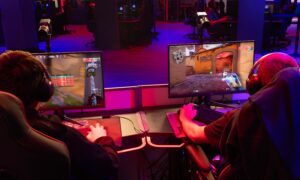ESports are becoming a popular addition to schools’ curriculums as it continues to grow. For many years, eSports have been rejected at academic institutions because of the negative stigmas and implications that come with young adults playing video games.
Opinions are quickly being swayed as the benefits of esports become clearer. As of early 2020, more than 170 colleges and universities actively participate in eSports in some way. Not only do many of these schools offer eSports programs, but also gaming facilities and over $16 million in scholarships.
Inevitably, high schools and state legislatures have followed their example. The number of leagues that have implemented eSports in high schools has nearly doubled since 2018. One popular league, the High School eSports League (HSEL), has over 1500 schools as members.
Although recent trends could possibly change their stance, most high schools don’t categorize their eSports teams under athletics. In many schools, they are deemed as an academic or extracurricular activity.
An eSports session in a high school consists of students working on their skills alongside their teammates and coach. Students run drills, develop specific gaming strategies, review game footage, and even compete against other teams across their state.
As students are exposed to more in-classroom gaming, they express rather grateful attitudes as many are now finding a way to implement their hobby with school. Video games are often shunned by many as a “waste of time,” but this idea is less widely-held than ever before.
Offering eSports in high schools, whether it be as part of the curriculum or as an extracurricular, has proven to also be effective in shifting the concerned opinions of parents. Many parents often respect their child’s academic institution; their choice to implement eSports drives parents to consider the benefits of gaming.
Benefits of eSports in School
Education professionals acknowledge that a student’s success is boosted by their participation in extracurricular activities. Whether a student decides to join the ice hockey team or movie club, both provide students the opportunity to improve their communication and teamwork skills, as well as a realm of support.
Over the past few years, many studies have been conducted in which conclusive evidence has shown that participation in school activities improves students’ performances and overall well-being. Some of the benefits include children missing less school, higher graduation rates, doing better in math and reading, and most importantly – feeling better about themselves. The way to facilitate this movement is for schools to diversify the activities they offer.
ESports Makes Success Accessible to More Students
Although a large population of high school students participate in traditional sports, almost half do not. By providing eSports as an option, it allows this margin of students to enter a school community they would have not felt welcomed in otherwise. These students now have an outlet for a hobby that they can add to their college resumes, and possibly turn into a career.
Social Interaction Can Help Change Negative Stigmas
It is possible one of the biggest reasons video gaming has been known to cause depression and anxiety is because of the lack of social interaction many gamers experience while cultivating their craft. Gaming, although entertaining, can be isolating. By adding in the team element to esports, it creates a community of support and acceptance for those participating.
Students Learn Similar Values to Those They’d Learn Playing Conventional Sport
Cooperation & Collaboration
- Working with others in a close environment allows children to better understand how they can achieve success through a community lens.
Social Skills
- Although eSports provides a space of support, it also facilitates room for conflict and therefore, forces students to manage interpersonal relationships in new ways.
Improves Cognitive Functions
- Processing and memory are greatly improved by exercising the brain.
Accountability & Time Management
- A student with academic commitments and a team relying on them helps to foster
responsibility with not only time, but their actions.
Handling Success & Failure (and learning from it)
- Participating in a competitive team sport makes it clear that one can not always win. This
helps students manage both sides of the coin.
Positive Social Values
- Family members and friends often recount their sports coaches as some of the most influential people in their lives. This can be attributed to the many positive values coaches instill in their students. (Ex. good sportsmanship, respect, passion, etc.)
Esports in High Schools Promotes College and Future Career Opportunities
Involved students are more likely to go into higher education, and with more students getting involved – the diversity in college applicants continues to blossom. Many students interested in eSports tend to become interested in the technology software aspect of the industry. Careers in STEM can vary but are a great fit for those in the gaming world, as many colleges with an avid eSports culture usually offer an intense STEM curriculum.
As the eSports industry continues to grow, so does the need for those to work in the industry. Many sports teams need more than just players. The opportunities to grow professionally and personally would be maximized in this way.
These are aspects of eSports to consider when applying for college and university scholarships as almost 100% of them are members of the National Association of Collegiate Esports (NACE). Ultimately, the success of high school eSports largely depends on accessibility, affordability, and interest, but the efforts and arguments being made in favor of eSports are very compelling.









